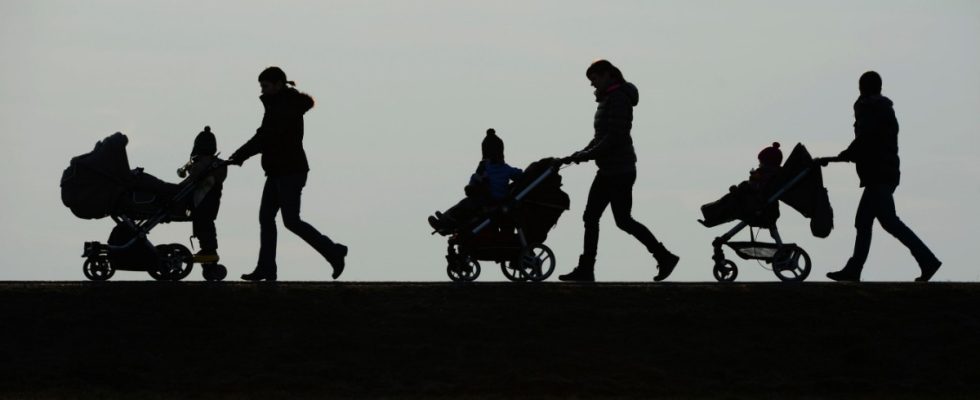For a long time, the federal government struggled to come up with a draft budget for 2024. Now he is – and a planned saving relates to parental allowance. The traffic light coalition wants to halve the income limit so that fewer families than before get it. She regrets that, says Federal Family Minister Lisa Paus (Greens), but she had to make these savings. The answers to the most important questions at a glance:
What is parental allowance?
Anyone who works less or not at all after the birth of their child receives parental allowance in Germany for up to 14 months. This is intended to financially support families and single parents and give parents the opportunity to take time for their child, as the Federal Ministry for Family Affairs writes. The amount of the parental allowance depends on how much the respective parent earned before the birth and whether there is no income after the birth.
Who gets parental allowance?
All parents in Germany who look after their child themselves and who do not work more than 32 hours a week. It doesn’t depend on the type of work. The unemployed, students and mini-jobbers also receive parental allowance, as do the self-employed and civil servants. Anyone who receives citizenship benefit or social assistance or is an asylum seeker is also entitled to this – in these cases, however, it is fully offset against these benefits as income.
Currently, only couples who earn 300,000 euros or less a year together receive parental allowance. For single parents, the limit is 250,000 euros. The Federal Ministry for Family Affairs has so far argued that top earners who are above these limits do not need any special support to financially bridge parental leave.
What changes could come now?
The federal government wants to dampen the “expenditure dynamics” for parental allowance, in other words: it wants to save. Nothing should change in terms of the amount, but the circle of those who get it should become smaller. The income limit for couples entitled to parental allowance is to be halved from 300,000 to 150,000 euros gross annual income, as announced by Minister for Family Affairs Paus. That would affect about 60,000 families. It is not yet known what changes are planned for single parents.
In the coming year, expenditure should fall by 290 million euros to almost eight billion euros compared to this year, again Mirror reported.
Anyone who does not work after the birth of their child receives parental allowance – roughly two thirds of their previous income, a maximum of 1800 euros.
(Photo: Felix Kästle/dpa)
What is the criticism?
The cabinet wants to adopt the draft budget this Wednesday. The changes come at short notice and could catch couples who are expecting a child and who have made firm plans with the parental allowance cold. Critics also fear that the planned cuts will hit couples with similar incomes particularly hard. Half of the household income would then be lost during parental leave. If one parent earns significantly more than the other, it could become much more difficult for families to divide parental leave between the partners at all.
In terms of equality for women, however, this is “not a highlight,” admits Paus. However, it was important to her not to reduce the benefit herself for those who need parental allowance. Minister of Finance Christian Lindner (FDP), with whom she had long argued about savings, countered via Twitter: “If the colleague responsible is not convinced of the change in parental allowance, then she can and should make her contribution to consolidation in a different way.”
What was and is the purpose of parental allowance?
Mainly at the instigation of the SPD, parental allowance was introduced by the grand coalition in 2007. Last but not least, it should try to increase the low birth rates, especially among higher-earning academics. The birth rate in Germany at the time was 1.36 children per woman – one of the lowest in the world, as the relevant draft law stated.
Parental allowance works primarily as income compensation for the parent who stays at home. It should reduce the risk of financial dependency, especially for women. At the same time, it should be made easier for young families to combine family and career.
An incentive was created for the higher-earning parent (usually the man) to also take parental leave. Therefore, the law was seen as an important factor for a more equal distribution of childcare. Above all, the partnership bonus, which promotes the double part-time model, supports this. Child-related income losses still lead to “unrecoverable financial disadvantages” and increased “risks of poverty” for women, it said in the justification for the law.
How much parental allowance is paid?
There are different types of parental allowance. The “basic parental allowance” is available to both parents for a total of 14 months from the birth. It is between 300 euros and 1800 euros a month, depending on how much you earned before the birth. Each parent can claim “basic parental allowance” for two to twelve months. Single parents receive parental allowance for up to 14 months. “Elterngeld Plus” is available twice as long; it is aimed at parents who are already starting to work part-time again. The amount depends on how much they earn after the birth of their child. There is also the option to receive a “partnership bonus” for up to four additional months. This allows couples to work in parallel between 24 and 32 hours a week.

